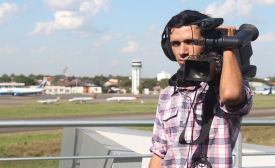international broadcasting
The good news, however, is that propaganda is back. I don’t mean the unfragrant mob of internet miscreants — hacking is to propaganda what stalking is to romance. I mean the impulse to choose a side and press its case with wily elegance. Those of us who grew up in the Cold War have rather missed it — the persistent, well-designed, all-encompassing salesmanship of Life’s Correct Path, backed up with textbooks, posters and unspeakable stockpiles of nuclear weapons.
Sitting in my bedroom, 200 miles from Aleppo, social media makes it easier than ever to spectate the atrocities of the civil war. But has social media changed the reality of organising a protest on the ground? [...] There are a small number of major competitors for protest organisation platforms. Facebook, of course, has cornered the market. Twitter also plays a role.
If you were to ask the VOA’s editors why they run stories that violate their Charter, they would probably tell you that they don’t have the manpower to cover everything. But these lapses are, in the end, inexcusable. [...] If the VOA’s editors have to choose between running a one-sided story that violates their Charter, or no story at all, then they should run no story at all.

The Voice of America was never intended to do investigative reporting, nor should it.
At other times, forged documents and fabricated news items consistent with Russia's strategic objectives have first appeared in obscure Swedish media outlets, which were picked up subsequently by Sputnik and "other sources of Russian public diplomacy" and broadcast to an international audience.
TV audiences in New Zealand will for the first time be able to see Chinese TV dramas and films dubbed in English on a local channel. It's being made possible by an agreement signed on Friday, aimed at bringing CRI's popular China Theatre program to a Kiwi audience. [...] This will be the first time English-dubbed Chinese TV dramas will have been shown in Oceania.
The Kremlin is trying to split the West by spreading “altered facts,” conducting blackmail and setting up front organizations, the U.S. State Department said, in 1981. So-called active measures were common during the Cold War, when the U.S. and the Soviet Union sought to unify and divide Europe with equal urgency. Now those tactics appear to be back, retooled for the digital age







